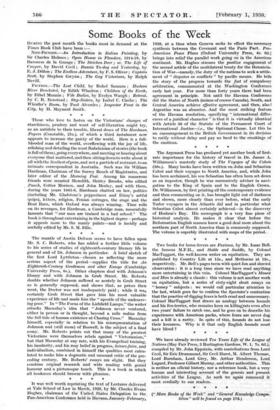The mantle of Austin Dobson seems to have fallen upon
Mr. S. C. Roberts, who has added a further little volume to his series of studies of eighteenth-century literary life in general and of Dr. Johnson in particular. A brief sketch of the first Lord Lyttleton—chosen as reflecting the more serious aspect of the period—supplies the title for An Eighteenth-Century Gentleman and other Essays (Cambridge University Press, 6s.). Other chapters deal with Johnson's library and with Johnson in Grub Street. Mr. Roberts doubts whether Johnson suffered so acutely in Grub Street as is generally supposed, and shows that, as prices then went, the Doctor was not inadequately paid ; while it was certainly Grub Street that gave him his most valuable experience of life and made him the " apostle of the undeserv- ing poor." In " The Focus of the Lichfield Lamps," the writer attacks Macaulay's idea that " Johnson never ventured, either in person or in thought, beyond a mile radius from the full tide of human existence at Charing Cross." Macaulay himself, especially in relation to his misrepresentation of Johnson and (still more) of Boswell, is the subject of a final essay. Mr. Roberts points out that many of the greatest Victorians were themselves rebels against " Victorianism," but that Macaulay at any rate, with his Evangelical training, his insularity, and his rosy belief in progress, laissez-faire, and individualism, combined in himself the qualities most calcu- lated to make him a dogmatic and unsound critic of the pre- ceding century. Mr. Roberts' essays are slight. But they combine original research and wide reading with genial humour and a picturesque touch. This is a book in which all bookmen should browse with pleasure.






































 Previous page
Previous page